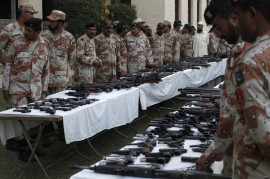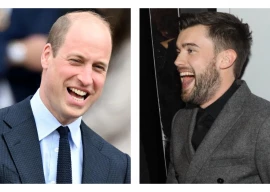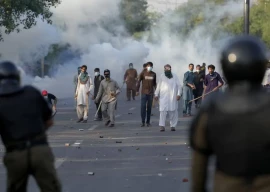
As many as nine casualties, including Chaudhry Aslam; in the first nine days of 2014 explain the hazards of the environment in which the Karachi police operate. During 2013, police fatalities reached a staggering 166, up from 122 in 2012. This represents a three-fold increase compared with 2011, when about 53 cops fell in various operations.
Police losses in Karachi also provide an alarming indicator of rapid deterioration since 1992; in the 18 years until 2010, for instance, the police lost about 250 personnel, an average of roughly 14 a year. But the annual average since 2011 has jumped to 114.
One can count several reasons for these losses; they mostly result not only from the continuous nature of crime and militancy in Karachi, but also from non-state outfits. The dwindling effectiveness of the police also stems from the fact that in a polarised city such as Karachi, collective interests of politics, bureaucracy, militancy and organised crime far outweigh the capacity of police, which are hamstrung by many factors.
Firstly, the deputation of roughly 20 per cent of the police force for protocol/ VVIP duty adversely affects an already extremely poor citizen-police ratio in a city with a bulging population, spiralling crime and militant politics.
The enormity of organisational and operational problems can be gauged from the fact that despite arrests of roughly 12,000 suspects since the launch of the clean-up operation a few months ago, crime and terrorism continue to plague the city. Even though paramilitary authorities claim to have rounded up scores of target killers and members of various criminal gangs, hardly any long-term solution is in sight because of the limited investigation and prosecution capacity of the state.
Secondly, poor means of communication, such as unfit vehicles, absence or lack of life vests, bullet-proof jackets, as well as a limited number of armoured vehicles put a poorly trained police at a disadvantage.
Thirdly, officials of a largely politicised force often find it difficult to go after elements which may have links to their benefactors or mentors.
Fourth, the police — despite being strong on paper — suffer from a bad image, tainted by charges of massive and blatant corruption, as well as abuse of authority. Intellectual limitations, i.e., insufficient education in law and rights represents another deficit.
This perception of the police requires a massive corrective intervention. A recently launched capacity and image-building initiative by the Sindh government probably also stems from the realisation that the police need to be ‘retooled’. Being executed with funding from the German government, this initiative aims to help improve the public image of the Sindh Police.
At least verbally, most politicians agree on the need for the revision of the police laws of 1861 in order to reform the police, both intellectually as well as administratively. People at large need to push their representatives for reforms. This capacity-building initiative can also help reduce the trust between the citizen and the police.
Without drastic reform, the police cannot really function as society’s first line of defence.
Published in The Express Tribune, January 14th, 2014.
Like Opinion & Editorial on Facebook, follow @ETOpEd on Twitter to receive all updates on all our daily pieces.
COMMENTS (10)
Comments are moderated and generally will be posted if they are on-topic and not abusive.
For more information, please see our Comments FAQ




























1714024018-0/ModiLara-(1)1714024018-0-270x192.webp)










@imtiaz gul:
You are reading my actual identity, Sir. Yours is a police state under occupation of the khakis, every entity being allowed to use violence against the civilian population. Upon response, however, they all squawk like the jackass.
Rex Minor
Let us not knit-pick and focus on issues as to whether they exist or not and what to do about that.I don't want to indulge in any debate with people who don't even have the courage to write their real identity.
@imtiaz gul:
Not true, Sir!! The definition for the Police Force in all recognised democracies is to maintain law and order, public order in service of the people. You people are using the cliches which the colonialist used in their colonies against the natives.
Rex Minor..
The 1st and last line off defence in any true Democratic state is the Supreme Court
Sir, police becomes the last line of defence if one keeps in mind the kind of challenge being faced by the state of Pakistan in the hands of terrorists. The problem is jot with the defence, either first one or the last one, but the problems lies with the behaviour of the line of defence. Majority of security personnel belong to remote, illiterate and highly conservatory stove backgrounds, do not coinciding with the approach of modern Pakistan and its thinkers like you. Hamid Waleed Advocate
@Asma B: will all due respect for Dr.Adil Najam and his intellectual brilliance, let me tell you that the phrase " first line of defense" is not an individual's invention. This is how police is described and stands for in the common governance jargon.
Unless you change the setup and make police local, nothing would change. Let us remove the colonial system of policing, devolution of powers to local level would produce results, nothing happens overnight, it is a process and processes takes time. Get rid of the centralization of forces and devolution is the answer. A combination of local and province level law enforcement would certainly be better than what we have. Provide local police with the tools to tackle the problem.
Well then its a good thing that secular parties who are so eager to go to war undertook serious, honest and lasting steps to strengthen the police system and prepare it.
O no, wait.... they didnt! Everyone knows PPP and MQM's relationship with the police... and of course ANP's name is cropping up over kickbacks in procurements. Fighting an existential battle indeed!
Sir, wasn't the point about police being first line of defense against terrorism first made by Dr Adil Najam in different articles? Give credit where due, no?